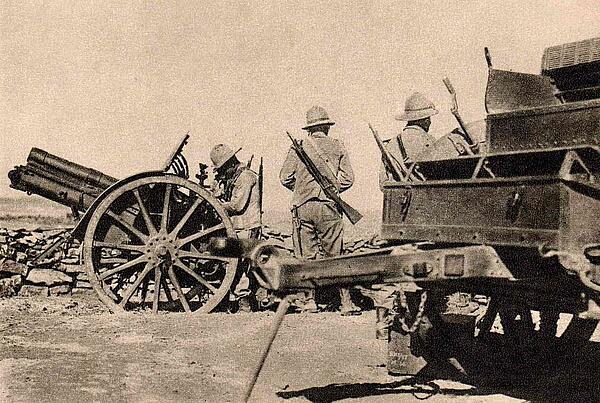Abyssinia 1935
Long-term background to the crisis
In the late 19th and early 20th centuries (1881-1914), there occurred the 'Scramble for Africa'. European powers raced against each other to colonise territories in Africa; by the end of the period, 90 per cent of the continent was under European control. Only Abyssinia (Ethiopia) and Liberia remained independent.
Italy joined in this 'Scramble', but only managed to conquer the apparently 'unimportant' territories of Eritrea, Somaliland and, later in 1912, parts of Libya. In the 1890s Italy tried to expand its empire by conquering Abyssinia. Its army was routed by the Abyssinians (backed by Russia) at the Battle of Adwa in 1896.
Italy felt humiliated by the crushing defeat at the hands of a poorly equipped Abyssinian army, despite the fact that Italian troops had been enormously outnumbered. Italian national pride was wounded.

Mussolini and the invasion of Abyssinia
Benito Mussolini ruled Italy from 1922, and set up a legal dictatorship in 1925. He had an inflated ego and saw himself as a contemporary Julius Caesar who would eventually preside over an immense Italian empire, equal to that of Ancient Rome.
Under Mussolini’s watch, Italy signed a disingenuous Treaty of Friendship with Haile Selassie, the emperor of Abyssinia, in 1928. In fact, Abyssinia was already being considered as a possible target.
The treaty of 1928 decreed that the border between Abyssinia and Italian Somaliland was 21 leagues parallel to the Benadir coast. In 1930, however, Italy constructed a fort beyond the twenty-one league limit. The fort was built at the Walwal oasis.
From November 1934, WalWal became the focus of Italian-Abyssinian tensions. In December 1934, there was a skirmish at the fort between armed Abyssinians and Somalis in Italian service. Both sides accused the other of aggression.
International observers became increasingly concerned as Italy steadily built-up troops in Italian Somaliland and Eritrea in 1935. In October 1935, Italy invaded Abyssinia.
Equipped with pre-World War One rifles, the Abyssinian army struggled to fight against Italy's modern fighting machine. Italy even used mustard gas during the invasion. Addis Ababa, the capital, was subjugated in May 1936. The King of Italy, Victor Emmanuel, replaced the Emperor Haile Selassie on the throne. Italy's African possessions – Abyssinia, Eritrea and Somaliland – were joined together and named Italian East Africa.
How did the League of Nations respond to Italian aggression?
Italy and Abyssinia were both League Members. As early as January 1935, Abyssinia appealed to the League for help in arbitrating the Walwal dispute. Abyssinia appealed to the League several times during the year for help.
When Italy invaded in October, the League condemned Italy as the aggressor and started implementing sanctions. But oil – which Italy needed to wage war – was not included in the sanctions. The League concluded that America would simply provide Italy with oil if sanctions were imposed.
France and Britain over-estimated the strength of the Italian Navy. They were therefore wary about antagonising Mussolini in the Mediterranean, where Britain had two important naval bases, Gibraltar and Malta. These fears impinged on Britain's decision to keep open the Suez Canal. Blocking this route would have severely damaged Italy’s war effort: Italy relied on the canal to transport supplies to her army.
The Hoare-Laval Plan
In December 1935 Samuel Hoare, the British Foreign Secretary, and Pierre Laval, formed the Hoare-Laval plan, designed to end the war. This gave great swathes of Abyssinia to Italy, with a gap through the middle left to the Abyssinians. Italian businesses would have access to the South of the country. If they accepted the plan, the Italians would be required to end the war.
Unsurprisingly Mussolini agreed to the plan, but when the plan was made public in Britain there was widespread public outrage. Hoare was lambasted for betraying the people of Abyssinia, and was called upon to resign. The plan was promptly dropped, and Mussolini continued unhindered with the invasion. Despite its short life, the mooted Hoare-Laval plan was terrible PR for the League of Nations. Its two most important members had been prepared to conspire with an aggressor nation.
Consequences
The League had again showed itself to be impotent. It had managed to impose sanctions against Italy – unlike in 1931 – but they were anaemic and half-hearted. France and Britain had colluded with an aggressor state and had teetered on the brink of giving in to them.
The League's response, however weak, pushed Fascist Italy into the arms of Nazi Germany. Mussolini called Adolf Hitler a 'silly little monkey' when they first met; now, in search of allies, he turned to the Nazi leader.
See also: Haile Selassie and the league of nations
MLA Citation/Reference
"Abyssinia 1935". HistoryLearning.com. 2026. Web.
